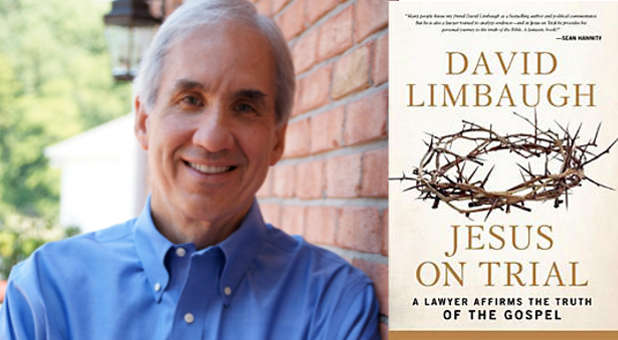When David Limbaugh let his friend Steve know that he had doubts about Christianity, he was surprised by Steve’s response. Instead of a blast of arrogant judgmentalism, Steve responded like a Christian should—with grace and evidence. What has happened since that time is told in Limbaugh’s excellent new book, Jesus on Trial: A Lawyer Affirms the Truth of the Gospel. Limbaugh artfully tells his journey from skepticism about Christ to skepticism about skepticism and ultimately to trust in Christ.
David is a lawyer, but he doesn’t write like a lawyer. While he’s intellectually precise, he writes as if he’s sitting across the table from you, anticipating your questions and objections. This is rare for a book of Christian evidences (often called Christian apologetics). Such books often read like technical manuals, but not Jesus on Trial. Limbaugh not only does a masterful job of highlighting the abundant evidence that supports Christianity, his insights into what the scriptures actually say will have you marveling at the tapestry of scripture and the Savior who wove it.
From the very beginning, Limbaugh bares his soul, holding nothing back about how his previous doubts were shielded by an embarrassing lack of knowledge. He writes, “I knew, after all, that I hadn’t really given the Bible itself a hearing, much less a fair one. To my surprise— and this is embarrassing to admit—Steve showed me how verses of Scripture, both Old and New Testaments, were tied to others in content and theme with remarkable frequency. Amazingly, I had never looked at a reference Bible before, and I was blown away. My ignorance was on display, but Steve wasn’t remotely judgmental— to help me learn more, he even gave me that Bible. I was genuinely intrigued to discover that the Bible was not simply a mishmash of stories, allegories, alleged historical events, and moral lessons. There was obviously a pattern here, and for the first time in my life the Bible appeared to me to be thematically integrated. The scales on my eyes started peeling away.”
His two chapters called “Aha Moments” reveal the numerous tipping points in Limbaugh’s journey where scale after scale fell away—tipping points that no honest seeker of truth can ignore. Of course, as Limbaugh admits, many who are not interested in truth, or have their own agenda, ignore or remake Christ in their own image.
He writes, “We must not casually remake Jesus in the image in which we prefer to see Him or which conforms to the popular culture’s misperceptions about Him. Our politically correct culture may, presumptuously, choose to recast Jesus as indifferent to sin and saccharine sweet, no matter the circumstances, but this Jesus is God, and God cannot look upon sin. What do these revisionists make of the Jesus Who made a whip of cords and drove the moneychangers out of the Temple (John 2: 15)? … What do the revisionists say about the Jesus Whom Paul describes as “revealed from heaven with his mighty angels in flaming fire, inflicting vengeance on those who do not know God and on those who do not obey the gospel of our Lord Jesus ” (2 Thess. 1: 7– 8)? What of the difficult moral standard Jesus laid down in the Sermon on the Mount? Did He show indifference to sin there?” Limbaugh rightfully concludes: “This idea that Jesus is meek, mild, indifferent, and non-judgmental is the stuff of pure myth.”
In addition to correcting the culture’s emasculated view of Christ, Limbaugh has two fantastic chapters tackling the paradoxes of Christianity. These include: God’s plan of salvation, including the relationship between grace and works; the acknowledgement that we are sinful yet commanded to be perfect; the Trinity, that God is one in essence yet three in persons; that Jesus has two natures, human and divine; that you must give up your life to find it; that Christians are strong when they are weak; that God is sovereign yet humans have free will; that God knows all and is unchangeable, yet we are to pray; that the Bible is inspired yet written by men; and many others. The insights Limbaugh brings to these paradoxes are some of his own, and the best nuggets mined from Christian scholarship that I doubt you’ll find in one place anywhere else.
Limbaugh devotes several chapters to the evidence for the Bible, including its unity and reliability as evidenced through history, archaeology, prophecy and science. He debunks several myths and misunderstandings along the way, and then saves his final chapter for what many think is the atheist’s trump card against God: Evil.
Many years ago David provided me an “Aha Moment” during one of our very many theological discussions. He said, “Evil really bothers me, but only Christianity has a sensible answer to it.” There’s no question he’s correct. We wouldn’t even know what evil was unless good existed, and real objective good could only exist if God exists. As David explains, evil turns out to be a backhanded argument for God. In fact, evil is the very reason God entered human history in the person of Christ. Only his sacrifice can solve the evil in my heart and yours.
David puts it this way: “Don’t be offended by the notion that you must have saving faith in Christ. Don’t assume that God is making you jump through unnecessary hoops. He is the One Who suffered for you. He did this so that you could live. He doesn’t ask you to believe because He is on a divine ego trip, but because He loves you and wants you to latch on to Him in order to be saved from your sins.”
I just can’t recommend Jesus on Trial highly enough. Every thinking person should investigate the claims of Christ, who is unarguably the most influential human being to ever walk the earth. If his claims are true (and Limbaugh shows they are), then we won’t be putting him on trial—he will be putting each of us on trial. Only Christ can secure you a favorable verdict.
David Limbaugh will join cold case homicide detective J. Warner Wallace as a speaker at the CrossExamined donor banquet on October 9, 2014 at the Big Chill in Charlotte, North Carolina. For details on attending, email Gil@CrossExamined.org.







